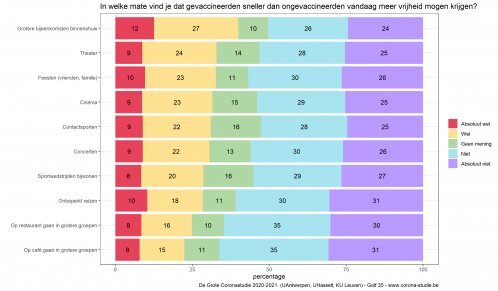End of travel ban comes too soon for two in three people
April 20th 2021
The Great Corona study shows that opinions on adjusting measures for vaccinated people are strongly divided
Last week, the Great Corona Study addressed the timing of the relaxations and the possible adjustment of measures for vaccinated people. Men, 18–35 year-olds and participants with a difficult financial situation are generally much more likely to say that relaxations come too late.
Last Tuesday, just under 22,000 people participated in the Great Corona Study, which was presented to the general public for the 35th time. The number of participants has thus remained at a ‘high plateau’ for many weeks, to put it in corona terminology. The Great Corona Study is an initiative of UAntwerp, in cooperation with UHasselt, KU Leuven, ULB and supported by a financial boost from the Research Foundation Flanders (FWO).
The large-scale questionnaire yields an enormous amount of data. ‘This data is only valuable if it is interpreted correctly’, Prof. Thomas Neyens (KU Leuven) says. ‘We know that our sample is not fully representative of the Belgian population, but using statistical corrections we can still make very meaningful statements.’
In this contribution the scientists frame the statistical interpretation of the Great Corona Study. As always, the questionnaires are reweighted by age, gender, education level and province, unless otherwise stated. Weightings are done for the whole of Belgium, but the results may be more accurate for Flemish Belgium.
Last Tuesday, participants were asked questions on, among other things, the timing of the proposed relaxations. The possibility of speeding up the adjustment of measures for vaccinated people was also discussed. The initial findings:
Men, 18–35 year-olds and participants with a difficult financial situation are generally much more likely to say that relaxations come too late. Opinions are strong on some topics, but much less so on others (such as reopening non-essential shops).
Reweighted percentages show that about 66% of the population consider the end of the travel ban (effective from 19 April) to come too early or much too early. The timing of the reopening of outdoor seating at restaurants and bars (planned for 8 May) is too early or much too early for 34% of the population. 33% are of the opinion that the reopening comes too late or much too late.
Depending on their profile, participants in the Great Corona Study prefer other relaxations to come first. The reopening of non-medical contact professions is relatively more important for people who are in financial difficulties, as well as for women, lower educated people and singles. The fact that the curfew is being replaced by a ban on gatherings is more important for those aged between 18 and 35, including students.
The scientists also questioned respondents’ attitudes towards possible early relaxations for vaccinated people. In a nutshell: 38% do not want or absolutely do not want any form of adapted measures for vaccinated people. 52% support at least one relaxation for vaccinated people. In most cases, this involves allowing inviting more people at home.

In essence, people who have to wait longer for their vaccine or who do not want to get vaccinated don’t grant vaccinated people these early relaxations. This means that, in general, older people think more favourably of adapted measures for vaccinated people. The older people are, the more likely they are to have been vaccinated or to associate with vaccinated peers.
78% of those vaccinated with one dose and 63% of those with two doses reported that they still follow the measures as strictly as before getting vaccinated. Younger vaccinated people, those with lower levels of education and those living in city centres are more likely to say that they are now following the measures less strictly.
Of those vaccinated who indicated that they now follow the measures less strictly, the results suggest that 60% do so indoors, 14% in professional situations and 44% outside with others (respondents could select multiple answers). In 47% of these cases, people who follow the rules less strictly are always or almost always vaccinated.